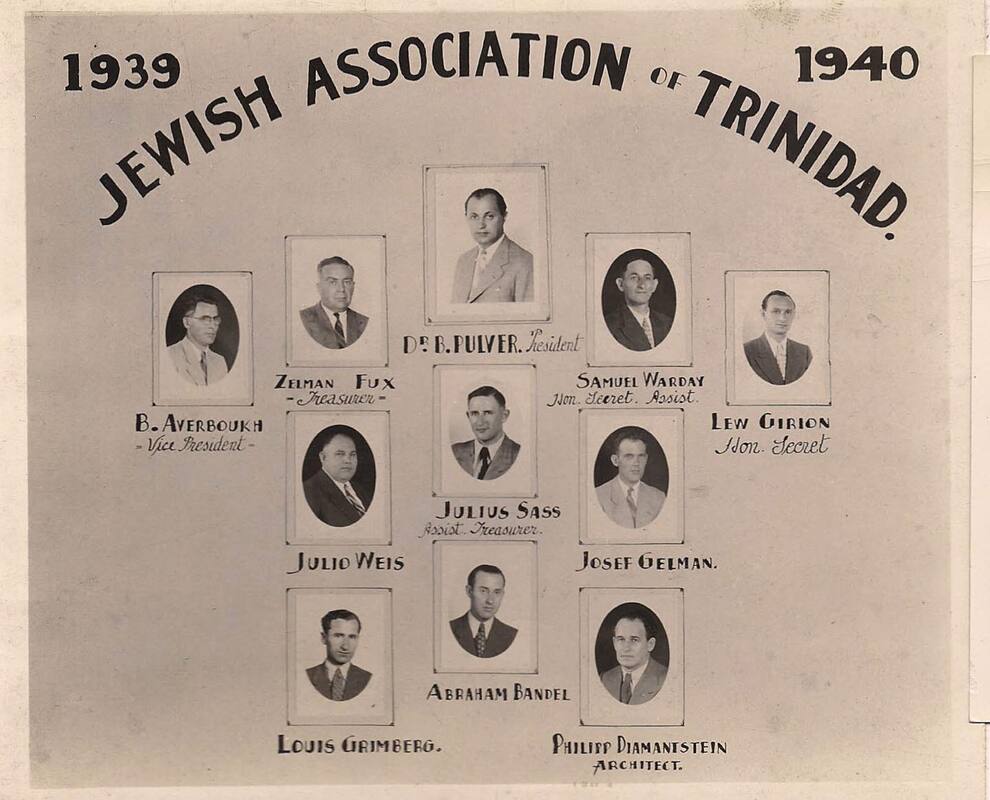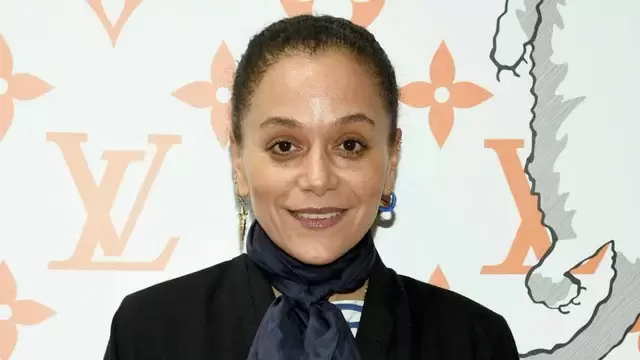|
The history of Jews in Trinidad is a fascinating one.
Many Jewish refugees fleeing Nazi Europe found a home here and were determined to build a strong Jewish community in Trinidad. Here’s some of the people who were looking to do just that. For more information about the Jewish Association of T&T, visit their Facebook page here or copy and paste this URL into your browser: https://www.facebook.com/jewishtnt/
0 Comments
Samira Nasr has been named editor-in-chief of Harper’s Bazaar U.S., according to a Wednesday announcement, making Nasr the first black editor-in-chief at a Hearst-owned publication.
Nasr, a former Vanity Fair fashion director, will begin her Harper's Bazaar tenure on July 6. "As the proud daughter of a Lebanese father and Trinidadian mother, my worldview is expansive and is anchored in the belief that representation matters," Nasr said in an introductory video released by Hearst on Instagram. "My lens by nature is colorful, and so it is important to me to begin a new chapter in Bazaar's history by shining a light on all individuals who I believe are the inspiring voices of our time." Hearst Magazine Chief Content Officer Kate Lewis said Nasr will create "something magical" at Harper's Bazaar, which launched in 1867 out of New York City. Source: The Hill, June 10, 2020 There will be a major addition to the education landscape in South Trinidad with the opening of a new international school. This will be the first international school in the Southland.
The Oxbridge International School (OXIS) will be coming to Irving Street in San Fernando. Its home is a modern multi-storey building with breath-taking views of the city and the Gulf of Paria. OXIS is a multi-level school, which takes children from Grade 1 (standard 1) all the way to 6th form. The school, therefore, takes in children at about age 6 and graduates them between 18 and 20. OXIS is divided into three schools – Lower, Middle and Upper. The Lower School runs from Grades 1-6 and ages 6-11. The Middle and Upper Schools run from Grades 7- 12 and ages 12 and up. Students are exposed to British and American curricula. As they progress, parents can choose which stream is better suited to their kids at Grade 10. Gifted students can pursue both streams. The American stream leads to SAT examinations for US university admission. The British stream moves students to iGCSE (Cambridge examinations) at Ordinary and Advanced levels. These are internationally accepted, and students wishing to attend university in Canada, England or the USA will be particularly well-served. Children attending Lower School in OXIS will not have to write the SEA examinations in order to move to Middle and Upper Schools. OXIS is a holistic education school so as could be expected, there are a lot of co-curricular and extra-curricular activities on the menu. Parent engagement is critical, and so children will be assessed on entry and receive customised education geared towards the development of a global mindset. Parents will receive regular feedback from the school on the performance of their child. Schoolwork is for SchoolOXIS told The 99% that it takes responsibility for a child’s education, relieving parents of the strain of doing further work when the child gets home The stress of excessive homework and projects for children is relieved by having dedicated tutors on hand to do the work with students after formal teaching is complete. After a full, fun and meaningful day, the kids can then play freely when they get home. The OXIS website is https://oxis.edu.tt Source: the 99%, June 2020 Irving Joseph, seated centre, celebrates his 105th birthday with his wife Joanne Joseph together with children and grandchildren at his Arima home At 105-years-old, Irving Joseph’s advice on living a long, productive, and fulfilling life includes having humility, caring for one’s family, and making one’s children a priority.
With a royal blue tuxedo, white shirt and grey tie designed two-layered cake, representative of Joseph’s long-time common attire and favourite colour, a small family gathering at his Arima home, was held in honour of his 105th birthday, which he celebrated on June 17. Now visually impaired for the past two years, Joseph would have liked to see his cake, which was described to him by his wife Joanne 60, and five of his six children who made it to the milestone celebration. Nevertheless, the old chap who donned a long-sleeved brown shirt was just in his glee to be still around. Describing the personality of her father, Josanne Joseph, his youngest, said he was always a very easy going individual, very simple and quiet. She also recalls his style of discipline: “He would not just tell you not to do something. Correction usually came with a long rigmarole story and then he would leave you to think about it so that you can do the right thing.” His method worked as Josanne said more often than not because he was so sweet about it, they had no choice but to do the right thing. The old adage—“Friends would carry you but they would never bring you back,” was also a lesson well instilled. Josanne shared with Guardian Media some of her fondest memories of her father in his former years like his Sunday evening ritual of shoe shining or the 1930s calypso tunes he would whistle while weeding the yard—calypsoes Josanne said none of his children knew. There were also many stories Joseph would tell of cutting bush to make roads. Joseph, a former oiler at the Ministry of Works and Transport, shares a unique relationship with his wife though the 45-year age difference. In a telephone interview with Josanne, she said she believed her parents’ relationship was perfect. “They have a very good understanding, my mother would always be the one to ‘front’ as the boss, but they are very old school. Dad would give her that leeway, but my dad always had the last say,” she said. Josanne noted another great thing about their relationship was their ability to resolve their differences without arguments. “I have never seen my parents argued. We would know something was up because mom would say she’s not doing this or that, but then, she would still make sure he had his meals and so on,” she said. Of Joseph’s experience living through the global pandemic and the many disruptions in social life it has caused, the ground provision lover declared he had never heard of such a thing in his born life. Making it to 105 is a gift from God for Joseph’s family, Josanne said: “For me, that is my dad, I do not ever want him to go anywhere, but my mom is the one who fusses about that time which she says will eventually come.” Source: The Guardian, June 2020 Hubert Fauntleroy Julian, nicknamed the Black Eagle, the first African person to obtain a pilots licence in the United States was born in Trinidad on January 5th, 1897. In 1922, when he was 25 years old, he flew over parades in support of Marcus Garvey. He subsequently purchased a plane with the expressed purpose of flying to Africa. When he attempted to depart from Roosevelt airfield in July 1924, the plane crashed and burned. He survived and spent the next month in a Long Island hospital before trying again. In 1929, he succeeded in a Trans-Atlantic flight only two years later than Charles Lindberg. In 1930 after flying to Ethiopia, Emperor Haile Selassie granted him Ethiopian citizenship and made him a Colonel in the Army. One year later, in 1931, he became the first black man to fly coast to coast over the American continent and broke the world record for endurance flying with a non-stop non-refueling flight of 84 hours and 33 minutes. In 1935, the Black Eagle commanded the small Ethiopian Air Force against the Italian invasion of that country by Benito Mussolini’s fascist forces. Four years later he wrote and produced the classic play, Lying Lips, which starred Robert Earl Jones, father of James Earl Jones. In 1965, in collaboration with John Bulloch, he wrote his autobiography, Black Eagle. Hubert Fauntleroy Julian, the "Black Eagle," died in New York on 19th February 1983. His achievements go totally unrecognized in his native Trinidad and Tobago Source: Virtual Museum of Trinidad & Tobago  Have you checked out our introductory guide to tracing ancestral roots in Trinidad and Tobago? It includes a summary of tips and genealogical resources to help you begin your family history research at home. We encourage you to start the process by documenting the information you already know and by interviewing relatives who may have more family knowledge. It’s also important to keep a personal archive of family memorabilia, such as photos, postcards, newspaper clippings, birth/marriage/death certificates, etc. which may give you unique clues into your family’s past. Once you have sufficient information, try building a family tree and filling in the gaps as you do more research. For reference, we’ve included a basic outline of a family tree on Page 4 of the Introductory Guide. You may find other sources of information in the official records of governments, cemeteries, archival institutions and libraries. See Pages 8-11 of our Introductory Guide for some general information on official records and where they can be located. For those of you who would like to visit the National Archives to view our records, please make an appointment via phone (+1 868-623-2874) or email ([email protected]) and give us an idea of the records you are interested in looking at. Click this link to access the Introductory Guide: https://bit.ly/37oNTVz. or click here |
T&T news blogThe intent of this blog is to bring some news from home and other fun items. If you enjoy what you read, please leave us a comment.. Archives
June 2025
Categories
All
|







 RSS Feed
RSS Feed